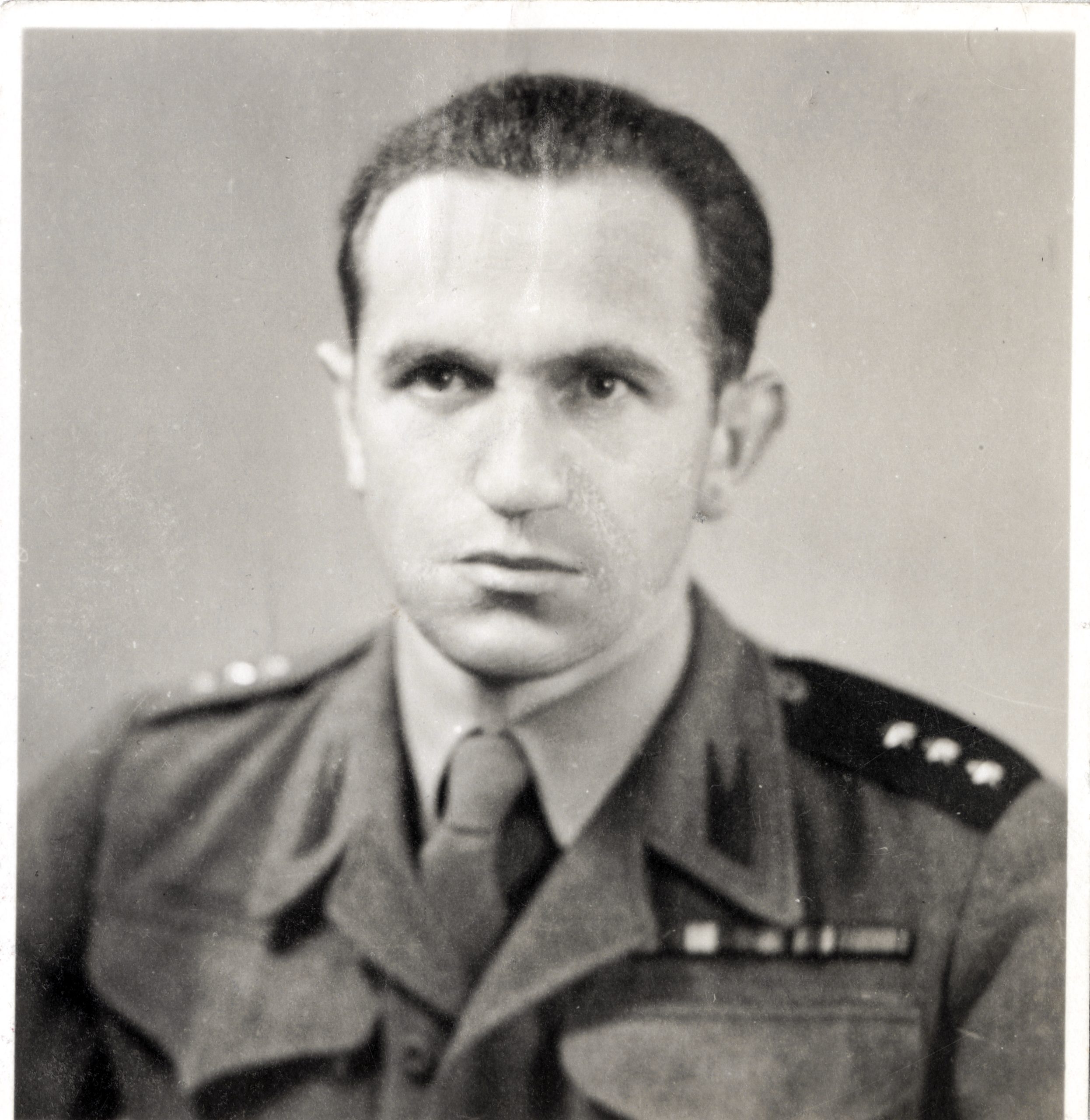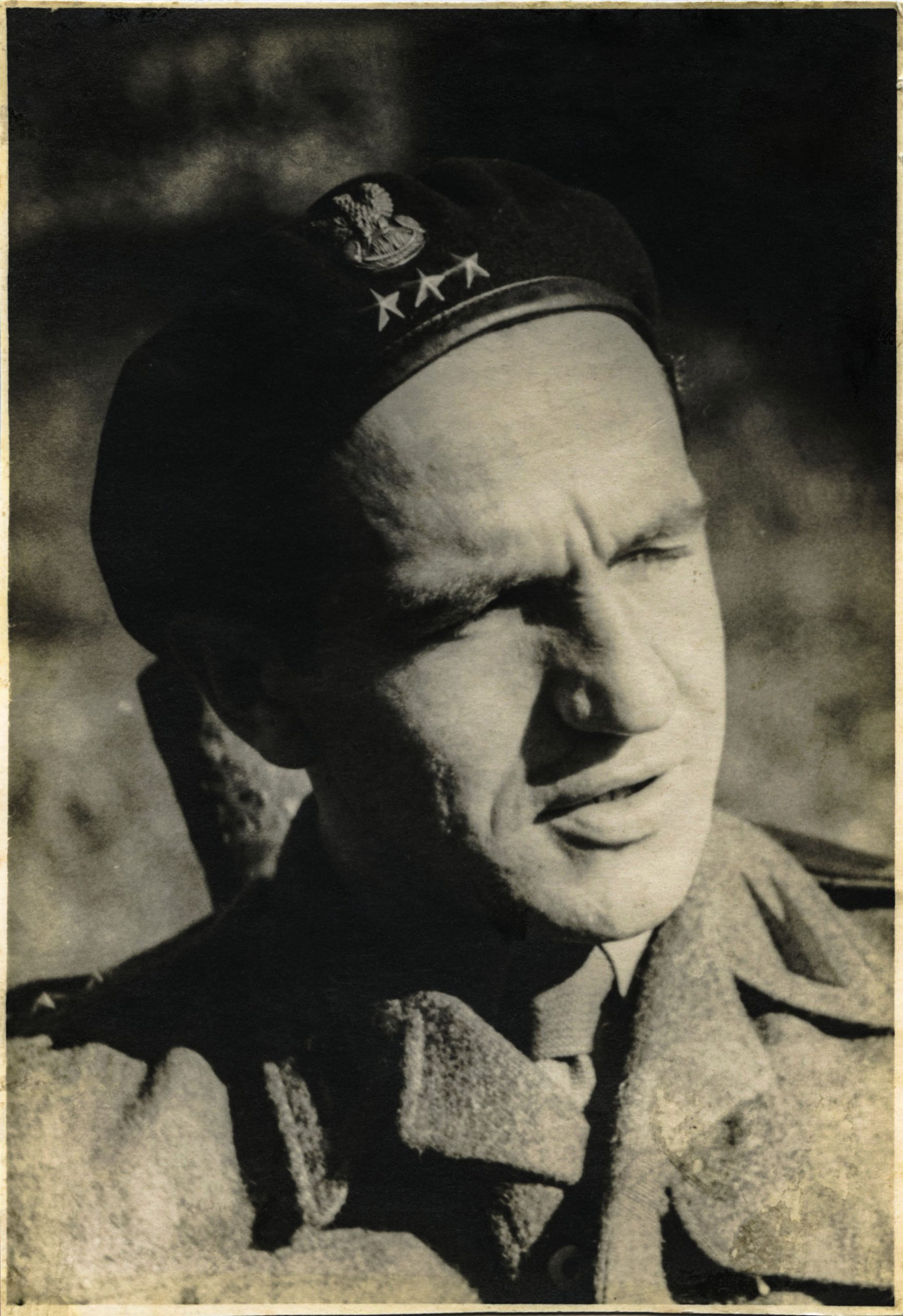By Nadia Rupniak, PhD
*This is an article from the Winter 2024 issue of Combat Stress
A letter found after my father’s death led me to discover his military decorations and the brutal retaliation inflicted on his family.
The transition from military service to civilian life presents many challenges for Servicemen and Servicewomen. They may have experienced combat trauma, the deaths of close friends, and political changes that seemingly negated their sacrifices. Recently, I discovered the terrible burden that my father, Captain Marcin Rupniak, took to his grave.
At my father’s funeral, I felt as if I’d never really known him. Why had a man with his remarkable intellect settled for menial work in a factory that was far below his capabilities? Why had he not made more of his life? Whenever I asked him about it, his explanation left me none the wiser: “Because of the war, my girl.”
I had no idea what he meant by that because he never spoke to me about the war. All I knew was that he had been a captain in the Polish army and could never return to Communist Poland because he would be arrested and shot. I didn’t know that the Polish army had made heroic contributions to the allied liberation of Europe in 1944. Fighting alongside American, British, and Canadian troops, they played pivotal roles in the victories at Monte Cassino1 and Falaise.2
After the war, my dad corresponded regularly with his brother, Tomasz, in Poland, but the contents of their letters, written in Polish, were a mystery to me. When the Soviet Union collapsed in the 1990s, Tomasz’s daughter, Helena, came to visit my dad. I couldn’t speak a word of Polish, nor she English, and so our limited communications went through him. As a result, I learned almost nothing about her or the reason for her journey.
It was not until both my parents had died that I discovered my dad’s family were victims of a Soviet genocide. Such was my dad’s secrecy about his family that my mother had written to Helena after her visit, requesting information. Among her personal papers, I found Helena’s reply. It said that during the war, my grandmother (aged 68) and three uncles were arrested and deported to Siberia because my dad was an officer in the Polish army.
I found Helena’s letter truly shocking. All those years, my dad lived with the guilt that his mother and brothers had been targeted because of him. This Soviet aggression explained why he could never set foot in Poland again. And my poor grandmother. How much suffering had this elderly woman endured? No wonder he didn’t want to talk about it.
I arranged to visit Helena to learn what had happened to our family. In case she was no longer at the same address, I also searched for other Polish relatives on the internet. When I typed “Rupniak” into the search engine, I was astonished to find a website listing my father as a recipient of the Virtuti Militari, the Polish equivalent of the Medal of Honor.3 I was in complete disbelief. Surely, this had to be an error. How was it possible that he had earned such high military distinction and never said a word about it to me? I promptly requested a copy of his military records.
Some months later, a large manila envelope landed in my mailbox. Inside, a dossier contained dozens of pages that bore my dad’s photograph, the words “Virtuti Militari,” and a war diary written in my dad’s distinctive handwriting. There had been no mistake. My father, a humble factory worker, was indeed a Virtuti Militari.
My friends assumed that I must feel incredibly proud, but that wasn’t how I felt at all. My chance discovery had pitched me into mental turmoil. Why on earth didn’t he tell me about this? Why had he deliberately kept me at such a distance, his own daughter? I was angry with him and ashamed of the lack of respect I’d shown him. I began to question the reliability of all my relationships. If I had misjudged him so badly, how many other good people had I dismissed?
Researching his service records, I learned that my dad was twice recommended for the Virtuti Militari during the invasion of Poland in 1939. He had shown great courage and leadership by firing on advancing German tanks from an exposed position, forcing them to retreat. During intense fighting, he had maintained command of antitank guns and took over communications when his telephone operator was killed. His cool head in the thick of battle won him the respect of his men and his superiors.
I read that Stalin had waited until the Polish Army was exhausted from weeks of continuous fighting before joining Hitler’s invasion.4 Unable to fight on two fronts, the Army received orders to evacuate. This march must have been agonizing for my dad, as he would have passed signposts to his hometown. The evacuation left Polish civilians, including his family, defenseless against the brutal German and Russian invaders.
My dad and thousands of other Polish Soldiers later regrouped in Britain, where they joined the Allied liberation of Europe in 1944. Hundreds of thousands more of these Soldiers, unable to escape, were captured by the Soviets and tortured, executed, or deported to hard labor camps in Siberia. Twenty-two thousand Polish officers were executed on Stalin’s orders, their bodies dumped in mass graves at Katyn.5 This massacre, rendering Poland incapable of launching a military uprising against its oppressors, was an act of genocide.
While I was researching these events, I heard back from my cousin, Helena. Considering the obstacles in communication I’d experienced with my dad; I was taken aback by her openness. She said that her father, Tomasz, loved his brother Marcin very much and had dearly wished to see him before he died, but travel was impossible during Communist rule. When Poland regained independence, she had visited my dad to fulfill Tomasz’s last wishes. Her letter added, “Marcin was very hurt by what happened to his mother, and he worried about it very much. Please don’t be surprised that he didn’t talk about it.”
Soon after this, I traveled to Poland and met with my cousins. They told me that it was not only Polish soldiers who were arrested by the Soviets, but also the families of Polish Army officers and others that were deemed enemies. From elderly grandparents to newborn babies, 1.7 million Poles were rounded up and deported to Siberia, my grandmother and three uncles among them. Most disappeared without a trace.
Armed Soviet Soldiers had come in the dead of night to arrest my grandmother and her sons Ludwik, Michał, and Józef. They were taken to the nearest railway station, where the men were separated and sent to hard labor camps. Józef and Ludwik were sent to a timber logging camp near the Arctic Circle. While working in the forests felling trees, Ludwik was killed by a bear. The death toll from starvation, cold, and disease was so high, that Józef knew he would also die unless he escaped. A locksmith by trade, the guards made use of him to repair locks at the perimeter gates. Twice, he broke out but was recaptured. Subjected to brutal beatings by the guards, he almost died. On his third attempt, he succeeded.
Most of the women and children were deported to Kazakhstan, a journey lasting several weeks in crowded cattle cars with a hole in the floor for a toilet. Upon arrival, they were taken to remote settlements to work on collective farms. Everything they produced was surrendered to the Soviet administrators in exchange for starvation rations. Constantly bitten by parasites and living in crowded, unsanitary conditions, infectious diseases took many lives.6,7
When Hitler ordered an invasion of the Soviet Union, the Polish president, Władysław Sikorski, worked with Prime Minister Winston Churchill to secure the release of the prisoners to form an army against Hitler. Stalin agreed, but only one tenth of the Poles were released and evacuated to safety in Iran, which was under British control. The evacuees were in appalling physical condition, emaciated by starvation, infested with parasites, and dying of typhus and other epidemics.8 Miraculously, my grandmother and her sons, Michał and Józef, reached Iran, but soon after their arrival, she and Michał died. Józef, the only survivor, later served with distinction at Monte Cassino.
The optics were not good for the West’s newly forged alliance with Stalin and an alternative explanation was manufactured to explain the arrival of 170,000 Polish refugees in Iran. Newsreels in America and Britain portrayed the Poles as having escaped from Nazi oppression.9,10 When the bodies of the murdered Polish officers were later discovered at Katyn, the crime was again reported in the West as a Nazi atrocity to preserve our alliance with Stalin.11
In Iran, the Poles were ordered by their British overseers not to divulge their treatment in the Soviet Union, blackmailed into silence to protect their families in occupied Poland and the prisoners still held in Siberia.12 The letters of Polish Servicemen were censored for content criticizing the Soviet Union and Soldiers were threatened with imprisonment if they spoke out. Polish leaders received repeated assurances from American and British politicians that in return for their army’s loyal service, their country would be liberated.
In 1944, Polish Soldiers fought alongside their allies in Europe under great psychological duress, not knowing the fate of their loved ones in Poland. Pursuing the fleeing German Army, the Poles constructed bridges across rivers and canals, naming them after Warsaw and other Polish cities. Each country they liberated brought them a step closer to home. In France, Belgium, and Holland they were mobbed by jubilant crowds celebrating freedom.
When the Polish Army got as far as Germany, only a few hundred miles from the Polish border, they were given orders to halt. The war was over. During secret meetings, the political leaders of America and Britain had ceded half of Poland to the Soviet Union. The effect on the Polish troops was devastating. My dad’s letters to Tomasz speak of betrayal and deceit, indicating that he felt “utterly broken and destroyed.” Some Polish officers committed suicide.
The American and British public saw Stalin as friendly “Uncle Joe,” who helped to rid Europe of Nazi tyranny. They were unaware of the need to liberate Poland from Soviet rule. Political leaders reneged on their promises to ensure free elections and Poland remained subjugated under a Communist dictatorship for five decades. The deportation of whole families from Poland to Siberia continued and Tomasz’s association with my dad put him in great personal danger. When a local official came to his house and noticed an airmail letter, Tomasz was arrested, beaten, and interrogated as a spy. He was lucky to have been spared deportation. This was why my dad wouldn’t talk to me about the war. He couldn’t risk any criticism or opposition of the Soviet Union, even from abroad, that might compromise his surviving family’s safety.
I can only imagine my dad’s disillusionment. Despite tremendous sacrifice and heroism, he would never see his family again. Forced to live in exile abroad, Polish Veterans had to settle for whatever jobs they were offered. My dad’s superior officer, General Stanisław Maczek, one of the most distinguished commanders of the war, earned a living as a bartender in Scotland.
I wish I had known about this while my dad was still alive. At least I could have supported him. Discovering what he endured fills me with admiration for his incredible resilience. Even though he’s gone, I feel closer to him now than ever.
If you would like to read more about my family’s experiences during the war, please visit my website www.nadiarupniak.com and YouTube channel https://www.youtube.com/channel/UCEGGC43hyDPYQXJKuaBW46g.
References
- Anders W. An Army in Exile. (2004). The Battery Press, Nashville TN.
- McGilvray E. Man of Steel and Honour: General Stansław Maczek. (2015). Helion Studies in Military History, Warwick, RI.
- Polish Order of the Virtuti Militari Recipients https://feefhs.org/resource/poland-virtuti-militari-recipients.
- Snyder T. Bloodlands: Europe Between Hitler and Stalin. (2012). Basic Books, New York, NY.
- Urban T. The Katyn Massacre 1940: History of a Crime. (2020). Pen & Sword Military, Barnsley, UK.
- Sklenarz K. Two Trains from Poland. (2011). Xlibris Corp., Bloomington, IN.
- Piechuta A., Chmielowski E., Czapulonis, A., Synowiec-Tobis S.H., Yon B. The Mass Deportation of Poles to Siberia. (2009). Classic Printing, Chicago, IL.
- Polish refugees flee Poland and arrive in refugee camps in Iran (Persia) (1943) https://www.youtube.com/watch?v=49A2pImHJgQ.
- HD Stock Footage WWII Polish Refugees in Iran Fight for Freedom 1943 Newsreel https://www.youtube.com/watch?v=OWTOVlqCO1o&list=PLE7F068B835C375E8&index=41&app=desktop.
- Memos show U.S. helped cover up Soviet massacre https://www.cbsnews.com/news/memos-show-us-helped-cover-up-soviet-massacre/.
- Prazmowska A. Britain and Poland 1939-1943: The Betrayed Ally. (1995). Cambridge University Press, Cambridge, UK.
- Mikołajczyk S. The Rape of Poland. (2007). Kessinger Publishing LLC, Whitefish, MT.
ABOUT THE AUTHOR

Nadia Rupniak, PhD, is presently completing a ten-year investigation into her family history, prompted by a chance discovery about her father, a Polish World War II Veteran. With exclusive access to his military service records and personal correspondence, Nadia discovered how he became a stateless immigrant after the shameful political betrayal of his country by its allies.
Nadia is also an internationally recognized neuroscientist with a special interest in depression and anxiety disorders. She has published over 140 articles, has given podium presentations at international conferences, and an article about her research was published in the Wall Street Journal. Despite her credentials, she had no idea that her own life had been affected by her father’s combat stress until she began researching his experiences during the war.
Nadia has BA and MA degrees from the University of Oxford, and a PhD from the University of London, UK. Her father was immensely proud of her admission to Oxford and displayed a photograph of her matriculation on his bedroom wall. She believes it represented the vicarious fulfillment of his own academic potential and aspiration to become a doctor before his life was upended by war.
Combat Stress Magazine
Combat Stress magazine is written with our military Service Members, Veterans, first responders, and their families in mind. We want all of our members and guests to find contentment in their lives by learning about stress management and finding what works best for each of them. Stress is unavoidable and comes in many shapes and sizes. It can even be considered a part of who we are. Being in a state of peaceful happiness may seem like a lofty goal but harnessing your stress in a positive way makes it obtainable. Serving in the military or being a police officer, firefighter or paramedic brings unique challenges and some extraordinarily bad days. The American Institute of Stress is dedicated to helping you, our Heroes and their families, cope with and heal your mind and body from the stress associated with your careers and sacrifices.





